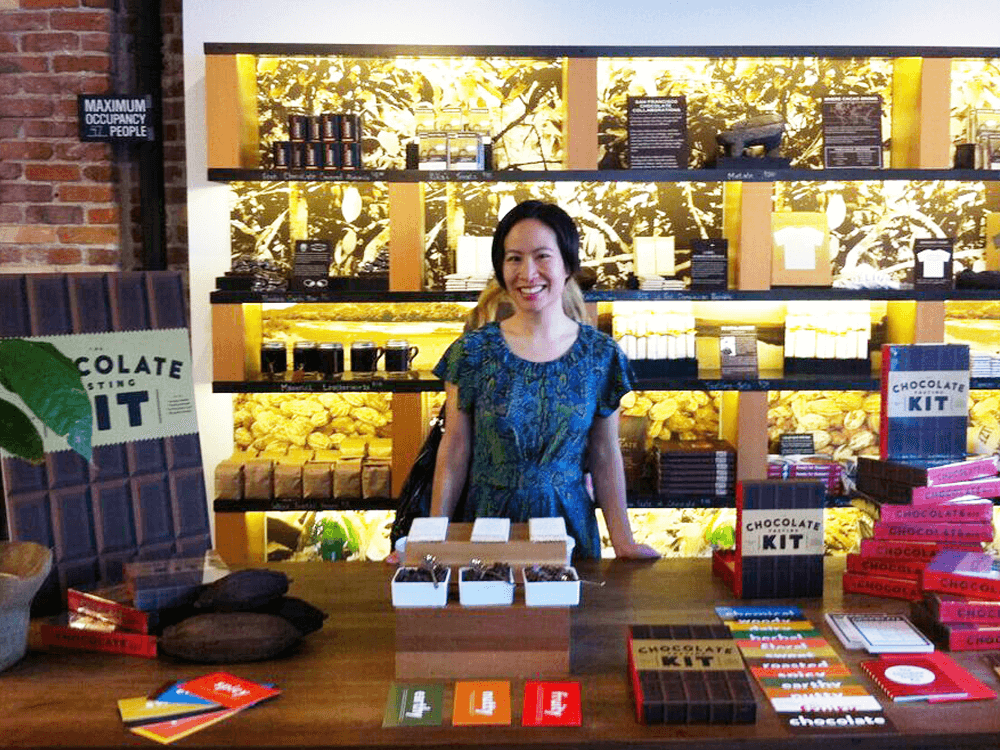Traveling for food is a new passion point with global travelers on the move. In a hats off gesture to the kings and queens of cuisine around the world, who inspire us to eat with adventure no matter where we are, TravelSquire brings you CHEF TALK, sponsored by Le Cordon Bleu.
Meet EAGRANIE YUH, author of The Chocolate Tasting Kit (Chronicle Books):
Eagranie Yuh is an award-winning food and travel writer. After completing her master’s degree in chemistry at Queen’s University in Kingston, Ontario, she attended Le Cordon Bleu Ottawa in the pastry program. From there, she combined her love of food and science and became a chocolate educator–digging into the science of how chocolate is made from the bean, and teaching people how to appreciate it (as a sommelier does with wine).
She is also a freelance writer and editor and has written for the Washington Post, the South China Morning Post and Saveur, as well as several editions of Best Food Writing. Most recently, she was senior editor of Edible Vancouver & Wine Country.
Eagranie lives in Vancouver, Canada and loves random acts of dancing and dogs with short legs. She is easily distracted. Web: thewelltemperedchocolatier.com Twitter/Instagram: @eagranieyuh
Q: What is your favorite dish that you learned to make at Le Cordon Bleu?
A: In Intermediate Pastry, there’s a cake called Marquise au Chocolat. It starts with a base of chocolate ladyfingers soaked with rum syrup and is topped with the most ridiculous chocolate mousse. The mousse was a source of stress in school because the cream and the chocolate must be precisely the right temperature and texture before you combine them. If you get it right, it’s like eating chocolate air. In the middle of that airy chocolate, there’s a sneaky layer of hazelnut praline and feuillantine (crispy, crushed flakes of a very thin crepe). The whole thing is finished in a shiny chocolate glaze and decorated with more chocolate. By the time students get to Intermediate Pastry they’re sick of rich cakes (which seems ridiculous, but true) and leave most of their classwork at school. But I took my Marquise home with me.
Funny enough, when I visited LCB to see if I wanted to enroll, the class I observed was the demo for the Marquise, and it was taught by the inimitable Chef Herve. In that demo, he made a large cake (that the students are expected to make in their practical lesson) and a smaller, individual-sized dessert. What I didn’t realize at the time is that the individual dessert was a bonus–and after the class, it was presented to me and my friend to eat. We were afraid to eat it because it was the most beautiful thing we’d ever seen.
Q: Did you have a memorable culinary experience in London where you studied that you can share?
A: While attending Le Cordon Bleu, I worked in a kitchen store on Bank Street in South Ottawa. (which has since moved to the suburbs.) Across the street, there was, and still is, a Lebanese bakery called Malak that makes the most exquisite pastries. I was familiar with baklava, but not the endless variations that you can get from filo, honey, butter and nuts. I’m pretty sure I bought one of everything the first time I went in, and it was all I could do to NOT buy one of everything from then on.
Q: Where in Vancouver can someone find a dessert like what was taught at Le Cordon Bleu?
A: In Vancouver I direct people to Thomas Haas Patisserie (Disclosure: Thomas was my boss, many years ago.) Thomas is Austrian and a third-generation pastry chef, and his menu is pretty similar to what I learned to make at Le Cordon Bleu but lighter, and with a nod to Vancouver’s palate, which tends to be less sweet and incorporates Asian flavors like lychee and sesame. www.thomashaas.com
Q: What country or city would you choose right now for a great culinary experience?
A: I’m fortunate to have family in Australia, and the food in Sydney always blows me away, especially the Southeast Asian food. I had a stupidly expensive bowl of Laksa (Ed. Note: a spicy noodle soup) the last time I was there, but it was worth it. In my mind, that’s the bar that all other Laksa experiences have to live up to.
Q: What is your favorite international food?
A: I hope it can be considered international, but to me it’s Chinese food (spoiler alert: I’m Chinese Canadian). There is so much breadth to Chinese cuisine – just as Italian cuisine is made up of many mini-cuisines – that there is a lot to explore. I have a soft spot for dumplings and noodles, which also span cultures. I like that you can take something so distinct to one cuisine, like a Chinese dumpling, and find its parallel in other cultures: raviolis, perogies, gyoza, pelmeni.

